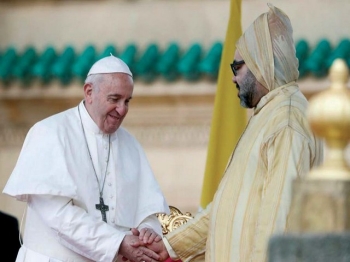The courage of encounter and an outstretched hand
 During the private meeting at the Royal Palace of Rabat, Mohammed VI and Pope Francis signed a common appeal aimed at recognizing the uniqueness and sacredness of Jerusalem.
During the private meeting at the Royal Palace of Rabat, Mohammed VI and Pope Francis signed a common appeal aimed at recognizing the uniqueness and sacredness of Jerusalem.
The Grand Master of the Order of the Holy Sepulchre was in the Holy Land with his team in early February, while Pope Francis made a trip to the United Arab Emirates, a country where eight of the nine million inhabitants are immigrants in a rather precarious position, among which many Christians of South- East Asia.
Speaking to Cardinal O’Brien and the Grand Magisterium about this first pontifical visit to the Arabian Peninsula, Msgr. Giacinto- Boulos Marcuzzo – Patriarchal Vicar for Jerusalem and Palestine – expressed the profound joy of the Christians of the Middle East regarding the Document on Human Fraternity. The text was signed in Abu Dhabi by the Holy Father and by the Grand Imam of Al-Azhar, leading Sunni University based in Cairo. It affirms the need for religious freedom and “to establish in our societies the concept of full citizenship and reject the discriminatory use of the term minorities which engenders feelings of isolation and inferiority.”
This document opens a new page opens in the history of relations between religions, 800 years after the friendly meeting between St. Francis of Assisi and the Sultan of Egypt al-Malik al-Kamil, nephew of the great Saladin, during the Fifth Crusade, at Damietta. The Document on Human Fraternity – signed February 4 in Abu Dhabi – is destined to become “a guide for the new generations in understanding the great divine grace that makes all human beings brothers.”
Muslims from the East and of the West, with the Catholics of the East and of the West, declare that they will adopt “the culture of dialogue as a way” and “mutual knowledge as a method,” to foster the values of peace, justice, goodness, beauty, human brotherhood and shared coexistence, which they consider as “an anchor of salvation” for all.
“The West can discover in the East remedies for those spiritual and religious maladies that are caused by a prevailing materialism. And the East can find in the West many elements that can help free it from weakness, division, conflict and scientific, technical and cultural decline,” states the Document,”a sign of the closeness between East and West, between North and South, and between all who believe that God has created us to understand one another, cooperate with one another and live as brothers and sisters who love one another.”
This text is the result of a friendly collaboration between the two signatories, who have met several times, especially during the papal visit to Egypt in April 2017. Pope Francis sees there – for the Catholic Church – the development of the teachings of the Second Vatican Council, in the wake of the journey of Saint John Paul II in Casablanca (August 1985) and of the interreligious meeting in Assisi (October 1986). “Processes must mature, like flowers, like fruit,” he commented on the plane that took him back from Abu Dhabi to Rome.
In the footsteps of the visit to Abu Dhabi, as well as the Document on Human Fraternity signed on that occasion, Pope Francis went to Morocco the last two days of March. He wanted to promote interreligious dialogue in this country that constitutes a natural bridge between Africa and Europe, recalling again the eight hundred years that had elapsed since the historic meeting between St. Francis of Assisi and the Sultan al-Malik al-Kamil. “That prophetic event shows that the courage of encounter and of the outstretched hand is a way of peace and harmony for humanity, where extremism and hatred are factors of division and destruction,” he pointed out before King Mohammed VI who welcomed him.
During the private meeting at the Royal Palace of Rabat, Mohammed VI and Francis shared a common appeal that sanctions the uniqueness and sacredness of Jerusalem. “We consider it important to preserve the Holy City of Jerusalem / Al- Quds Acharif as the common patrimony of humanity and especially the followers of the three monotheistic religions, as a place of encounter and as a symbol of peaceful coexistence, where mutual respect and dialogue can be cultivated. It is our hope, therefore, that in the Holy City, full freedom of access to the followers of the three monotheistic religions and their right to worship will be guaranteed”.
Brother Jean-Pierre – the sole surviving Trappist monk of the Tibhirine community, is a symbol of this tenacious commitment to interreligious dialogue at the service of hope. He now lives in the monastery Notre- Dame de l’Atlas, in Midelt, Morocco. On Sunday, March 31, the Pope bowed before this very elderly religious, kissing his hand in a sign of profound respect. It was an indication to us all on how we can renew the Church: by living the Gospel simply, by giving one’s life for love.
François Vayne
(May 2019)



